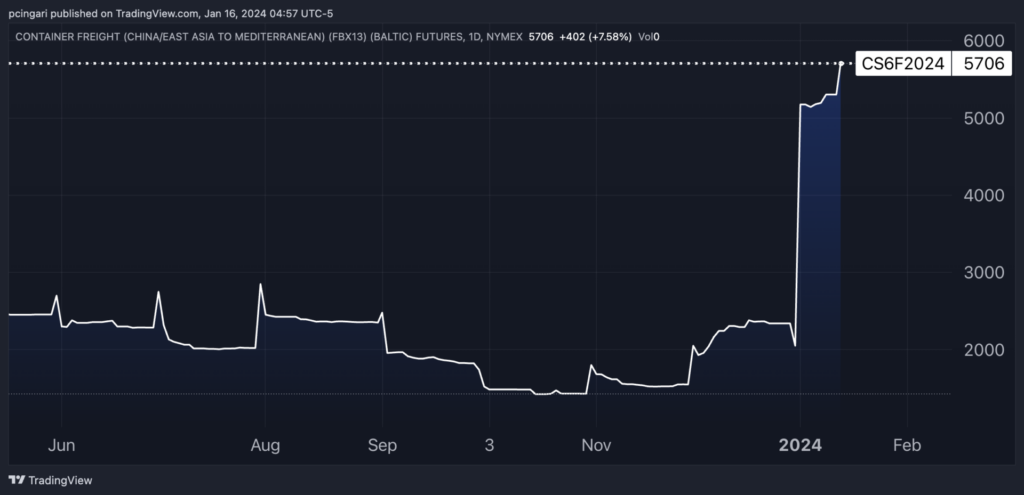Zinger Key Points
- Shell halts Red Sea shipments due to attacks by Yemen's Houthi rebels, escalating global shipping concerns.
- Secretary Blinken states Red Sea conflict impacts 15% of daily commercial traffic, 30% of world's container flow.
- Feel unsure about the market’s next move? Copy trade alerts from Matt Maley—a Wall Street veteran who consistently finds profits in volatile markets. Claim your 7-day free trial now.
British oil giant Shell plc SHEL has announced a complete halt to its shipments traversing the Red Sea, a critical global trade route, due to mounting security concerns.
This decision, as reported by the Wall Street Journal citing informed sources, is a direct response to the increasing frequency of attacks by Yemen’s Houthi rebels, signaling a heightening of regional tensions and their pronounced effect on international maritime operations.
This marks yet another avoidance of this vital trade route, reflecting the growing regional tensions and their influence on international shipping.
Shell’s move is not isolated. It follows a growing trend among energy sector giants to steer clear of the Red Sea corridor. BP was among the first to announce a similar decision last month, with Qatar Energy joining this cautious approach just this week.
Blinken Condemns Red Sea Disruptions
In an exclusive interview with CNBC at the World Economic Forum in Davos on Tuesday, Secretary of State Antony Blinken emphasized the critical impact of the current situation on global trade, stating, “15% of our commercial traffic is going through that area on a single day, 30% of the world’s container traffic, this is having international repercussions.”
He further added that this represents “an attack on the global economy and international shipping.”
Alarming Decline In Red Sea/Suez Canal Traffic
Data from oilprice.com paints a grim picture of the situation. Over the past month, there has been a drastic drop of more than 50% in commercial vessel traffic through the Red Sea/Suez Canal route. The escalating instability near Yemen’s coastline is a primary contributor to this steep decline. Recognizing the heightened risks, shipping majors like Hafnia, Torm, and Stena Bulk have recently ceased their operations in this key trade zone, adhering to advisories from the Combined Maritime Forces, a U.S.-led international coalition.
On Monday, Houthi forces targeted the Gibraltar Eagle, a U.S.-owned merchant vessel. Despite a missile strike, the Marshall Islands-flagged ship reported no casualties or significant damage and is persisting with its journey, according to U.S. Central Command.
Market Reactions
This geopolitical unrest have had tangible economic repercussions on shipping costs. Since the year’s start, shipping rates for a forty-foot equivalent unit (FEU) container from China/East Asia to the Mediterranean have nearly tripled, reflecting the compounded logistical and economic challenges posed by these developments.
Shares of major maritime shipping stocks continue to rise, as Red Sea disruptions lead to further margin increases. The SonicShares Global Shipping ETF BOAT was up by 0.7% at the time of publication Tuesday, capitalizing on the momentum from Friday’s 2.2% rally.
Oil prices edged slightly lower Tuesday, with the West Texas Intermediate (WTI) falling below $72 per barrel, down 0.9%.

Photo: Shutterstock
Edge Rankings
Price Trend
© 2025 Benzinga.com. Benzinga does not provide investment advice. All rights reserved.
Trade confidently with insights and alerts from analyst ratings, free reports and breaking news that affects the stocks you care about.